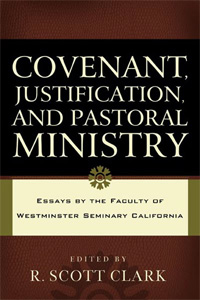§5. The covenant of God with man is different than those made by men among themselves. For men make covenants for mutual benefits; however, God makes covenant for His people. Indeed, the covenant of God is nothing other than the divine declaration . . . Continue reading →
Covenant Theology
Biblical Theology Isn’t New—It’s In the Catechism
HC Q. 19 (Pt 1)
Go the reference room (virtual or real), find a encyclopedia entry on “Biblical Theology” and one will likely find an entry that begins in the 19th century liberalism. Depending upon which entries one reads, one might find reference to the Dutch Reformed . . . Continue reading →
Office Hours—Sacred Bond: Covenant Theology Explored
Too often, the way covenant theology is presented, it seems too complicated to understand or explain to others. It doesn’t have to be that way and it isn’t in this interview with Zach Keele and Mike Brown, authors of a new introduction . . . Continue reading →
Robert Shaw On Republication In The Westminster Confession
It may be remarked that the law of the ten commandments was promulgated to Israel from Sinai in the form of a covenant of works. Not that it was the design of God to renew a covenant of works with Israel or . . . Continue reading →
Why Hebrews 9 Is Referring To A Covenant Not To A Testament
Most modern translations and commentators take diatheke as “will” or “testament” in vv. 16–17, but understand it as “covenant” in vv 15 and 18. As we have seen, the context of v. 15 seems to demand the sense of “covenant” because only . . . Continue reading →
The Old Covenant
One of the most difficult questions in describing the history of redemption is to give a clear, concise, account of the differences between the old and new covenants. When I say “old covenant” I’m not referring to everything that happened before the . . . Continue reading →
New In Print: Companion to Reformed Orthodoxy
Willem van Asselt, Irena Backus, John Witte Jr, Carl Trueman and others (including John Fesko and myself) are among those contributing to A Companion to Reformed Orthodoxy by Brill. If you’re interested in the academic study of the history of Reformed theology . . . Continue reading →
The Grace Of Law?
An HB Classic
The question comes: I once heard someone say (or write) that the Law was also “graceful” because at least in this God’s case, He was letting His subjects know what was expected and wanted from them. I appreciate the intent of the . . . Continue reading →
Olevianus: Why Covenant Theology?
Why is the redemption or reconciliation of humanity with God presented to us in the form of a covenant, indeed a covenant of grace? A: God compares the means of our salvation to a covenant, indeed an eternal covenant, so that we . . . Continue reading →
Calvin On Tasting Of The Powers Of The Age To Come And Falling Away
But here arises a new question, how can it be that he who has once made such a progress should afterwards fall away? For God, it may be said, calls none effectually but the elect, and Paul testifies that they are really . . . Continue reading →
Office Hours: Steve Baugh on Hebrews 13
Steve Baugh helps us wrap up our study of the book of Hebrews this season. We’re studying Hebrews 13 in this episode. He’s an expert in the 1st century background of the New Testament and Greek and he brings those skills to . . . Continue reading →
Resources For Those Beginning To Study Covenant Theology
For those just getting started in covenant theology I recommend: R. Scott Clark, “A Brief History of Covenant Theology.” Audio: What Is Covenant Theology And What Are The Implications For The Church And Family? Mike Brown and Zach Keele, Sacred Bond: Covenant Theology . . . Continue reading →
Kingdom Through Covenant: A Review (1)
With this post we begin a two-part review of Peter J. Gentry and Stephen J. Wellum, Kingdom Through Covenant (Wheaton: Crossway, 2012). § It is difficult to know what the best way to review such a large book is (778 pages plus . . . Continue reading →
Kingdom Through Covenant: A Review (2)
This is part 2 of a two-part review of Peter J. Gentry and Stephen J. Wellum, Kingdom Through Covenant (Wheaton: Crossway, 2012). The review is written by Harrison Perkins. He grew up in the south and attended college in Alabama. He began . . . Continue reading →
Ishmael and Infant Baptism
We heard a sermon from Genesis 17 this morning, and I couldn’t help but draw some conclusions relative to the current discussion about infant baptism that is ongoing at Together For the Gospel and at Between Two Worlds. Of course this is . . . Continue reading →
Witsius On Merit
I.I.XV. In the covenant of works, man is considered as working, and the reward to be given as of debt; and therefore man’s glorying is not excluded, but he may glory as a faithful servant may do upon the right discharge of . . . Continue reading →
Is There A Covenant Of Grace?
It’s not unusual for evangelicals, which movements have been heavily influenced by Anabaptist theology, piety, and practice since the early 19th century. In that case we would not expect them to be aware of the categories “covenant of works” and “covenant of . . . Continue reading →
What Is The Substance Of The Covenant Of Grace?
For most of 2,000 years the Christian church was universally agreed that there is one way of salvation, that the history of redemption was essentially unified. In the post-apostolic church this consensus began to develop very early in the 2nd century in . . . Continue reading →
What About Noah and Covenant Theology?
Taylor asks the question on the PB. My reply below: There are resources on covenant theology here. I would especially encourage you to read this collection of quotations from older writers on CT. There is a brief history here. My own views . . . Continue reading →
Lingering Doubts About Baptism
I could not understand why, given the Old Testament emphasis of God’s working through families, the New Testament did not signal a change in that policy. It seemed passing strange to me that the new covenant sacrament included women and Gentiles but . . . Continue reading →









